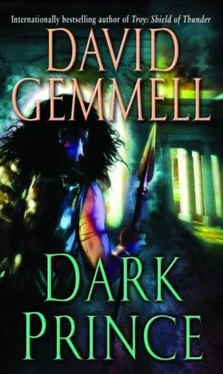'I saw the army myself. He has with him more than thirty thousand men.'
'Then it has begun!' shouted Hephaistion exultantly.
The Ida Mountains, 334 BC
The two armies met on a plain in the shadows of the towering Ida! Mountains. Hephaistion, riding alongside Parmenion, saw the tents of the Macedonians strung out like pearls upon a necklace, white against the green of the flatlands.
His soldier's eye scanned the regiments waiting ahead. He could see the six brigades of the Macedonian Foot Companions, 9,000 men standing to attention with spears held vertically. Alongside them were the 3,000 Shield Bearers, as Philip's Guards were now known. To the left were the Athenians and Corinthians, around 7,000 allied troops whose presence gave the expedition a united Greek appearance. To the right were the massed ranks of the savage Thracians. It was difficult to see how many there were, for they did not hold to formation but jostled and pushed in a heaving mass. But there must be, Hephaistion reckoned, more than 5,000 of them.
Alexander rode out from the centre of the army: his iron armour shining like polished silver, his helm beneath its white plume glinting with gold. Even Bucephalus was armoured now, with light chain-mail tied around his neck and over his chest, silver wires braided into his black mane and tail.
Hephaistion drew rein as Alexander approached, his captains riding behind him; Cassander, Philotas, Cleitus, Coenus and Parmenion's second son, Nicci.
The King rode directly to Parmenion and dismounted. The older man followed suit and knelt before Alexander.
'No, no,' said the King, stepping forward to lift the Spartan to his feet. ‘I’ll never have you kneel to me. Well met, my friend.' Alexander embraced the taller man. 'I want to hear all your news. But first I'll address your men, and then we will talk in my tent.'
Parmenion bowed and the King turned back to Bucephalus. The horse knelt as he approached and he mounted and rode to the head of Parmenion's 12,000 troops. They sent up a great cheer as he approached them, and snapped to attention. Their armour and cloaks were dust-covered and the men looked tired and drained.
'Well, my lads,' cried Alexander, 'it is good to see you again! You have led the Persians a merry chase. But the running is over now; from this moment we run no longer. We take the battle to the enemy and we will crush the might of Darius beneath our Macedonian heels.' A feeble cheer went up, but it soon died away. Alexander removed his helm, running his fingers through his sweat-drenched golden hair. 'Each man among you will today receive a golden Philip, and I have brought a hundred barrels of Macedonian wine to remind you of home. Tonight we will celebrate your achievements with a grand feast in your honour.'
Hephaistion was stunned. 12,000 gold Philips — each one a year's pay for a common soldier. . and given so casually! A tremendous roar went up from the soldiers which startled Bucephalus, and he reared on his hind legs.
Alexander calmed the stallion and cantered back to where the officers waited.
'Now to serious matters,' he said softly and led them back to the main camp.
Throughout the afternoon Alexander listened intently to the reports of Parmenion and Hephaistion as to the nature and organization of the Persian army. Darius had given command of the warriors to a renegade Greek named Memnon, and he, Parmenion pointed out, was a wily and skilful general. The Persians numbered some 50,000, half being cavalry from Cappadocia and Paphlagonia in the north.
'Brilliant horsemen,' said Hephaistion, 'and utterly fearless.'
'Have there been any major encounters?' Alexander asked.
'No,' answered Parmenion. 'Perhaps twenty skirmishes between outriders, but I avoided full confrontation.'
'No wonder your troops looked so weary,' put in Philotas. 'They have spent the last seven months running away from the enemy.'
'Parmenion was wise to do so,' said Alexander. 'Had we suffered a major defeat here, it is likely we would have lost support in Greece. That in turn would have made this current expedition almost impossible to mount.' He swung back to Parmenion. 'How much support can we expect from the Greek cities?'
'Very little, sire,' said Parmenion. 'At first they welcomed us, sending delegations to assure us of support. But as the months went by they lost heart. And Darius has now strengthened the garrisons in Mytilene and Ephesus.'
Hephaistion listened to the exchanges and watched Parmenion. The Spartan seemed stiff and ill-at-ease, his pale eyes never leaving Alexander's face. But if the King noticed his general's stare he gave no indication of it.
'Where is the enemy now?' Alexander asked.
'They are camped near the town of Zeleia,' Parmenion told him. 'Two days' march to the north-east.'
'Then we shall seek them out,' said Alexander brightly. Suddenly leaning forward, he gripped Parmenion's shoulder.
'Something is troubling you, my dear friend. Speak of it.'
'It is nothing, sire, I assure you. I am merely tired.'
'Then you shall rest, and we will meet again tomorrow morning,' said Alexander, rising.
Hephaistion remained behind when the others had gone and Alexander took him by the arm, leading him out into the moonlight to walk around the camp.
'What is wrong with Parmenion?' asked the King.
'As I wrote you, sire, he was angry at the slaying of Attalus and he spoke against the killing of Cleopatra and the babe. Also he was soon joined by the Theban, Mothac, who I understand witnessed the destruction of his city.
Something changed in Parmenion then. He is not the same man. Perhaps it is just his age. . I don't know. Except on matters of discipline or strategy, we rarely speak.'
'You think I can no longer trust Parmenion?'
'I do not think he is… yet… considering treachery,' answered Hephaistion carefully. 'But there is a great bitterness inside him.'
'I need him, Hephaistion — perhaps not for much longer. But I need him now . He knows the Persians and their methods. And whatever else he may — or may not — be, he is still the greatest general of this age.'
'He was once, sire. I am not sure about now; he is old and tired.'
'If that proves to be true,' whispered Alexander, 'then you shall see he joins Attalus for a very long rest.'
* * *
Parmenion drained his third goblet of mead wine and poured another. He knew he was drinking too much, but over the last few months only alcohol could dull the ache he felt, only wine could lift the weight from his soul. In his dreams he saw Philip and Attalus, young again and full of hope for the future. He saw the Sparta of the Enchantment, and held again the youthful Derae.
On waking he would groan and reach for the wine. So far his skills had not been affected — or had they? Could he have done more to thwart Memnon? Could he have defeated the Persian army?
'I don't know,' he said aloud. 'I don't care.' There was an iron brazier at the centre of the tent, glowing coals taking the chill from the night air and casting dark, dancing shadows on the canvas walls. Parmenion drew up a padded leather-topped stool and sat before the fire, staring into the tiny caverns within the flames.
'Do you wish to be alone?' asked Alexander, ducking under the tent-flap and approaching the seated man.
Parmenion did not rise. He shook his head. 'It does not matter. I am alone. Now and always,' he answered.
Alexander seated himself opposite the Spartan and sat silently for several minutes, scanning Parmenion's face. Then he reached out to take the general's hand. 'Talk to me,' he urged. 'There is something dark inside you. Let us shine a light on it.'
'Inside me ?' responded Parmenion, shaking his head in disbelief. 'Have I slain any babies of late? Have I ordered the murder of a loyal general? Have I removed from the face of Greece a city rich in history and legend?'
Читать дальше












